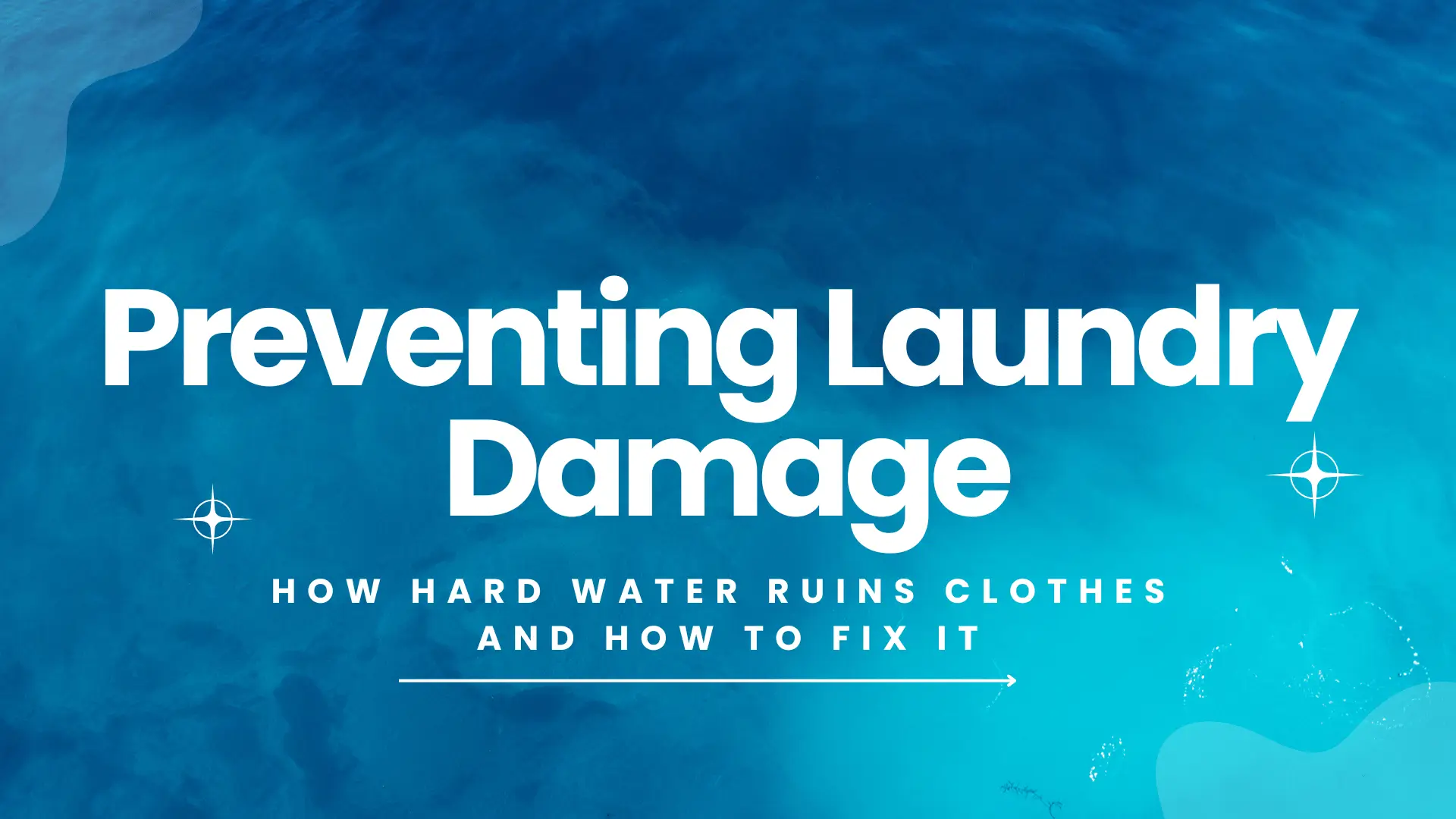If you’ve ever pulled your towels out of the wash and scratched your arm because they were scratchy, or washed a white shirt that came out with yellowish armpits, you’re not alone. In many parts of Texas, these laundry problems trace back to one culprit: hard water. Let’s walk through why this happens, what in Texas water makes it worse, and what you can do (including real solutions like ones from Aquapure) to keep your clothes looking fresh without wrecking your machines or wallet.
What’s Actually in Texas Water: Why Hard Water Is Common Here
The Mineral Problem: Calcium + Magnesium
Hard water means dissolved minerals—mostly calcium and magnesium. These come from natural sources (rocks, limestone, groundwater). When water flows through mineral-rich geology (like much of Texas has), it picks up these minerals. They don’t taste bad, but they can leave serious marks.
In many cities in Texas, hardness levels are high enough to classify the water as “hard” or “very hard.” For example, Richmond, Texas, reported water hardness at about 9.76 grains per gallon (≈ 167 mg/L), which is firmly in the “hard” water category.
Chlorine, Chloramines, Sediment, PFAS, and Other Add-Ons
Hardness isn’t the only water issue in Texas.
- Chlorine / Chloramines: Used for disinfection in many municipal systems. While they kill microbes, they can give off smell or taste, dry out fabrics, and fade colors more quickly.
- Sediment / Turbidity: Especially in well water, rural districts, or after heavy rains, sediment (sand, silt) can get into supply. Those particles abrade fabrics, clog machines, and leave spots.
- PFAS (Per- and Polyfluoroalkyl Substances), sometimes called “forever chemicals”: Texas is now regulating some PFAS in drinking water. Exposure has been detected in multiple public water systems.
These contaminants don’t always directly damage clothes, but combined with hardness, they worsen effects: color fading, fabric wear, appliance damage.
Real Effects of Hard Water + Other Contaminants
Some effects are obvious; others creep in slowly. Here are what people in Texas often experience (or should watch for).
On Clothes & Laundry
- Fabrics feel stiff, scratchy, or rough, especially towels and jeans.
- Whites get dingy, yellow, or gray faster; colors fade unevenly.
- Detergent doesn’t foam or clean well, so you use more detergent and still see stains.
- Residue remains on collars, underarms, or seams.
- Odors cling: fabric that smells “musty” even after laundering, because minerals trap debris, oils.
On Appliances & Plumbing
- Limescale buildup inside washing machines, dishwashers, water heaters — reducing heating efficiency, increasing energy bills.
- Pipes and fittings accumulate deposits, reducing water pressure or clogging inlets/jets.
- Increased wear & tear: moving parts, valves, heating coils have shorter life.
- More frequent maintenance/repair needed.
On Daily Life & Health
- Skin / hair dryness. Soap scum can leave a film, making showers less comfortable.
- Potentially irritation for sensitive skin.
- High PFAS / chemical levels can carry health risks (depending on degree of exposure). Texas is now setting maximum levels for PFOA, PFOS and monitoring to ensure safety. TCEQ
How to Identify Water Problems in Your Home
Before you spend on big fixes, it helps to know exactly what you’re dealing with. Here are ways to test, observe, and diagnose.
Signs & Experiments You Can Try
- Taste / smell / feel: Is your water “metallic,” “chlorine-y,” or does it leave a film when skin dries?
- Soap doesn’t lather: If it takes a lot of soap (or dish soap, body wash, etc.) to get suds, that’s often due to hardness.
- Residue on fixtures: White crust on faucets, showerheads, rings in sinks/tubs, spots on glasses.
- Laundry stiffness / fading: Towels get rough, colors fade, collars get yellow.
- Spotty machine performance: Longer wash times, poor rinse, needing extra cycles, water heater clogging, clothes need re-washing.
Getting Water Tested
- Contact your city or water utility: Many municipalities publish annual water quality reports (consumer confidence reports). These often include hardness measurements, chlorine, PFAS monitoring, etc. For example, Austin has detailed annual reports.
- Purchase an at-home water hardness/quality test kit: For hardness, pH, chlorine, etc.
- Hire a certified lab: Especially if you have well water or suspect PFAS or specific chemical issues.
How Texans Are Especially Affected: Regional Notes
Texas is big and water issues vary widely. Some examples:
- In central Texas (Hill Country, Austin area), groundwater is common and naturally hard (lots of limestone).
- In coastal regions / Gulf Coast, chloride (salt) intrusion can add more “mineral load.”
- Urban areas often use surface water mixed with groundwater; treatment practices (chlorine, chloramines) differ, so taste, smell, disinfectant residuals vary.
- Rural / well-water homes often have more sediment, less frequent testing, and higher variability.
Knowing your water source (surface, groundwater, well) gives clues.
Practical Advice: What You Can Do (Without Breaking the Bank)
Solving hard water and related laundry damage doesn’t mean moving to another city. Here are concrete actions.
Immediate, Low-Cost Fixes
- Use detergents formulated for hard water. Some are labeled “for hard water”; they include ingredients that help bind (chelate) minerals.
- Increase wash temperature (when safe for the fabric), because heat helps dissolve mineral deposits and improve detergent performance. But be cautious: hot water can shrink or fade some clothes.
- Use more rinse cycles to remove residues.
- Add boosters: e.g. vinegar in rinse (helps dissolve minerals), baking soda in wash (can help with odor, pH balancing).
- Clean washing machine & washer drum/seals regularly to remove buildup. Occasionally run a self-clean cycle or use citric acid rinse.
Medium to Long-Term Fixes: Filtration, Softeners, Systems
These are the more permanent solutions.
- Whole-house water softeners: These systems typically use an ion-exchange resin to swap out calcium & magnesium ions for sodium or potassium. They address hardness everywhere in the house (laundry, shower, sinks).
- Water filtration systems: Filtering out chlorine, chloramines, or PFAS often requires activated carbon, reverse osmosis (for drinking water), or specialized filters. For laundry-use water, you can combine a softener + filtration or have inline filters.
- Customized solutions: Tailoring the system based on what your water test shows (how hard the water is, whether you have PFAS / chemical contaminants, sediment, etc.).
When choosing, consider: capacity, maintenance, cost (initial + ongoing), and whether you want to treat entire house or just laundry + kitchen.
Aquapure: How It Helps (In a Natural Way, Not a Push)
Since Aquapure is family-run here in Texas and has been trusted locally for over ten years, it often comes up as a reliable solution. Here’s how it fits into this picture without being pushy.
- Aquapure provides customized solutions for every home’s needs: they don’t do one-size-fits-all. After testing, they recommend softeners or filters tailored to your hardness levels, contaminant profile, usage, budget.
- They offer water softener installation with free installation and support by certified technicians, so you don’t have to struggle with DIY or worry about sloppy installs.
- Financing options like easy financing, $0 down payment, Buy Now – Pay Later are often available, which lowers barrier for upgrades.
- A lifetime warranty is offered on many products, giving peace of mind: if something breaks or underperforms, they’ll repair/replace.
- Texas-owned, family-operated business, meaning they understand local water issues and support your community—not some impersonal national chain.
If your test shows serious hardness or chemicals, a whole-house softener + filtration from an outfit like Aquapure could save you money (on soap, energy bills, appliance repairs) in the long run.
Here are two relevant links for readers:
- Water softener: https://aquapurellc.com/water-softener-system-installation/
- Water filtration: https://www.aquapurellc.com/home-water-filter-system-installation/
Step-by-Step Plan for Homeowners in Texas
Putting it all together, here’s a realistic path:
- Check your city’s water quality report (or well report). Note hardness (mg/L or grains), chlorine/chloramines, PFAS monitoring if available.
- Test your home’s water — both for hardness and any suspect chemicals or sediment (especially if you have well water).
- Evaluate how your clothes & appliances are behaving: stiffness, color fading, odor, performance.
- Decide on level of treatment needed:
- If hardness is moderate and you only care about laundry, maybe a targeted system (softener or point-of-entry filter) is sufficient.
- If hardness is high and there are PFAS / chemical contaminants, a combined system (softener + filtration) is better.
- Research options / get quotes. Consider long-term cost (maintenance, salt or filter replacements, warranties).
- Install and maintain. Clean filters, regenerate softener resin (if salt based), monitor performance.
Local FAQ: Texas-Specific Laundry & Water Questions
Here are some questions people in Katy, Houston, Dallas, etc. often ask. (Katy is just one example, but applies similarly elsewhere.)
| Question | Answer |
|---|---|
| Is Katy tap water safe? | In general, yes. Katy gets its water from municipal systems that are regulated by Texas Commission on Environmental Quality (TCEQ) and the EPA. Safety regarding pathogens, lead, etc., is monitored. That said, “safe” doesn’t always mean “ideal for laundry.” Even if water meets drinking standards, hardness or chlorine levels may still cause laundry or appliance issues. |
| Do I need a water softener in Katy? | If your water hardness is causing problems (stiff towels, fading clothes, needing extra detergent), then yes, a softener will help. Many Katy homes are in areas with moderately hard to hard water. Having a water test will clarify whether it’s cost-effective. |
| How much does this cost in Katy to get a water softener or filtration installed? | It depends on system size, type (e.g. salt-based softener, salt-free conditioner, filtration for PFAS, etc.), capacity, and complexity (whole-house vs point-of-use). For many homeowners, financing options (including $0 down) help spread the cost. Businesses like Aquapure often provide free quotes so you can compare. |
| How much does repairing clothes cost vs treating water? | Over time, treating water often saves money: fewer replacement clothes, lower detergent usage, less wear on machines, lower energy bills because appliances run more efficiently. If your hard water is bad, the “invisible” costs can add up. |
| Will a water softener fix PFAS issues? | Not completely. Water softeners primarily remove hardness minerals (calcium, magnesium). For PFAS (which are synthetic chemicals), filtration (e.g. activated carbon, special media, reverse osmosis) is usually required. Aquapure’s filtration systems can be customized to address PFAS along with other chemicals. |
When It’s Time to Act: Signs You Shouldn’t Wait
Here are red flags that mean you should move beyond “just living with it”:
- Clothes and towels are getting ruined noticeably every few months.
- The washing machine needs repairs more than once a year (heating element, valves, etc.).
- Water heater or plumbing has scale that’s reducing performance.
- High energy bills, especially for heating water.
- Test results show elevated PFAS or other chemicals, or chlorine/chloramine levels causing taste / smell problems.
Final Thoughts & What You Should Do Next
Hard water + chlorine + other chemicals in many parts of Texas isn’t just a nuisance. It literally shortens the life of clothes, costs more in detergent and energy, and can degrade appliances sooner than needed. The good news is: there are proven, practical ways to fix or dramatically reduce the damage.
If you’re in Texas and suspect your water is hurting your laundry (or more), here’s what I recommend as neighborly advice:
- Request a free water test from a reputable local provider (companies like Aquapure often do this).
- Get a quote for comparing filtration, softener, or combined systems.
- Consider financing options so you’re not paying everything up front.
- Once you install, keep up maintenance: regenerate softener, change filters, check performance yearly.
By doing this, your favorite shirts should last longer, your towels will feel plush, your washing machine won’t make you want to pull your hair out—and you’ll save money long-term.



